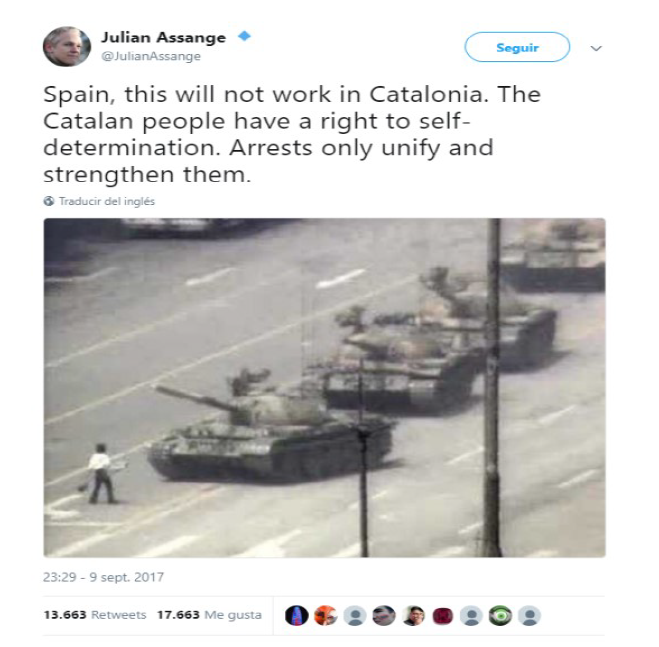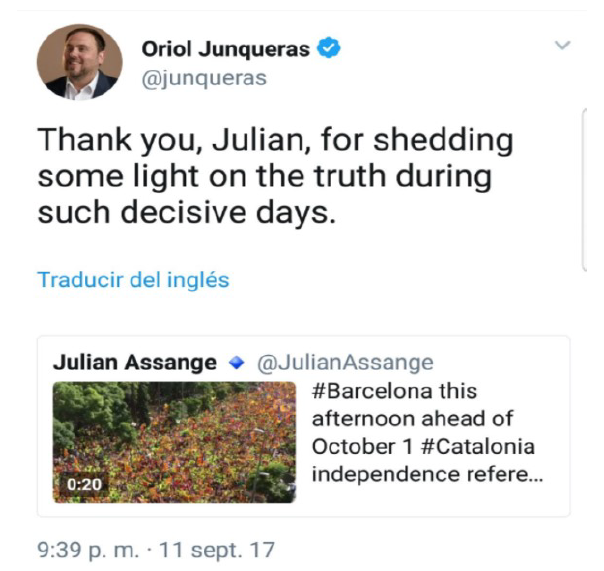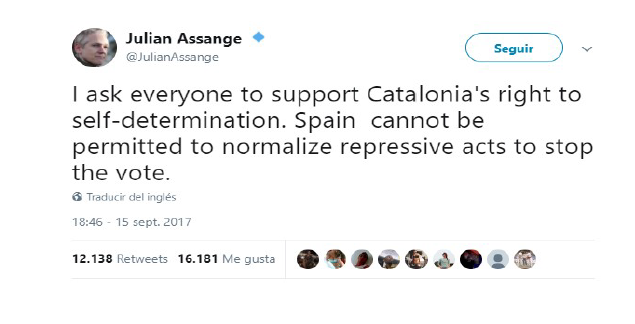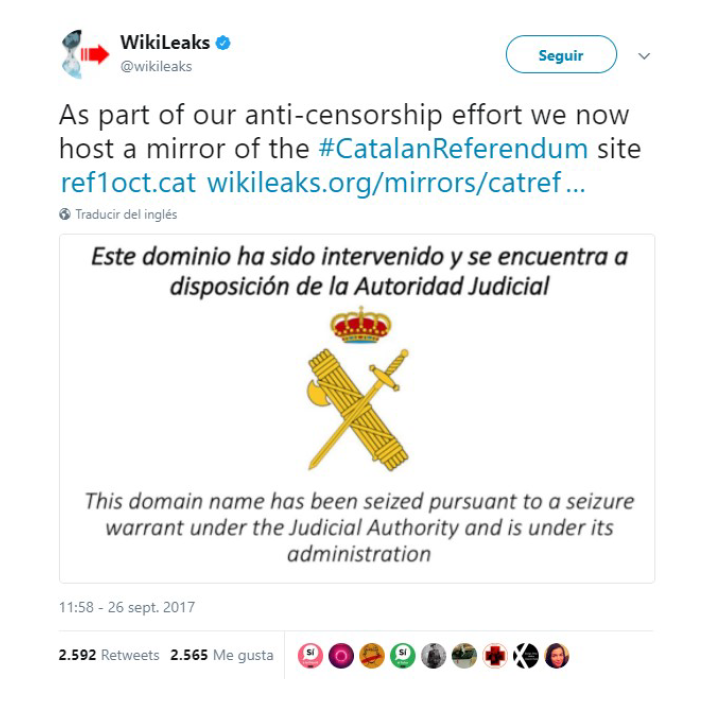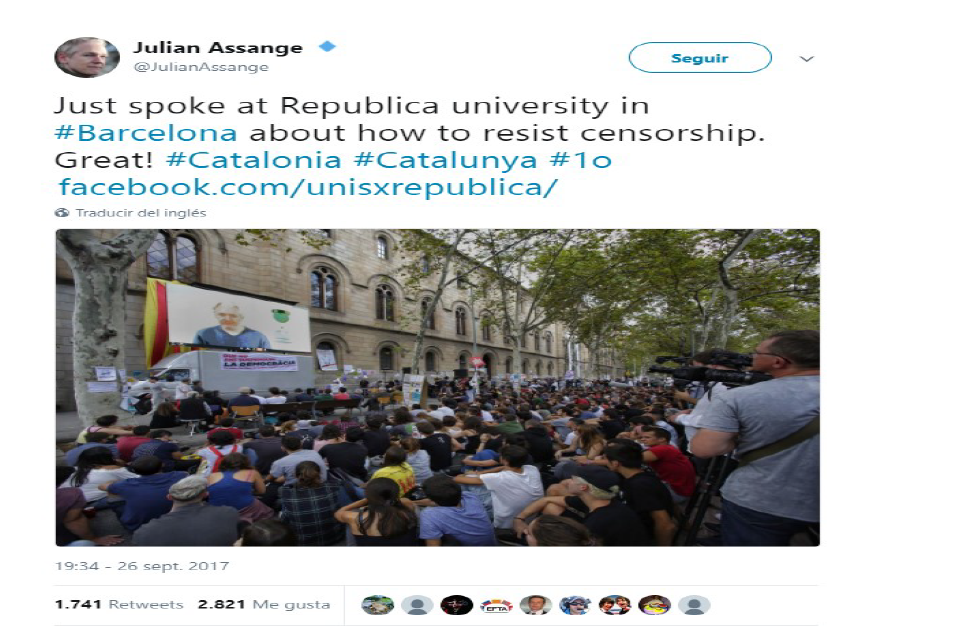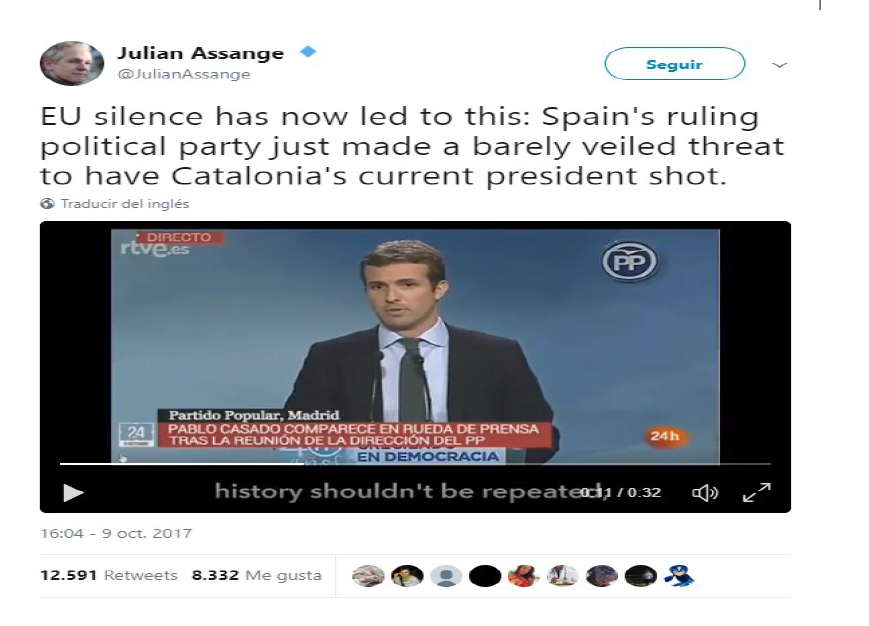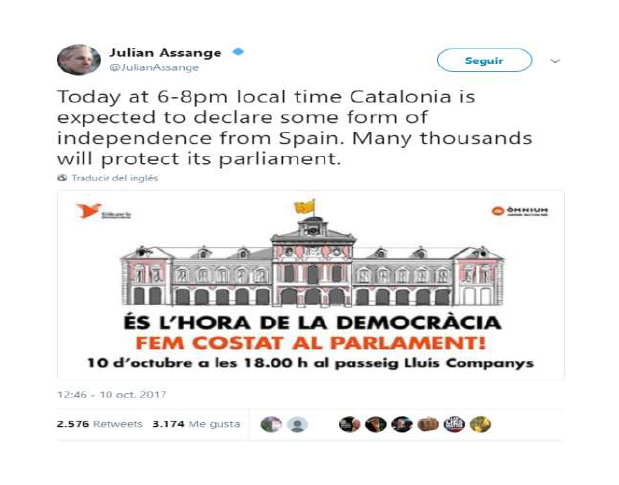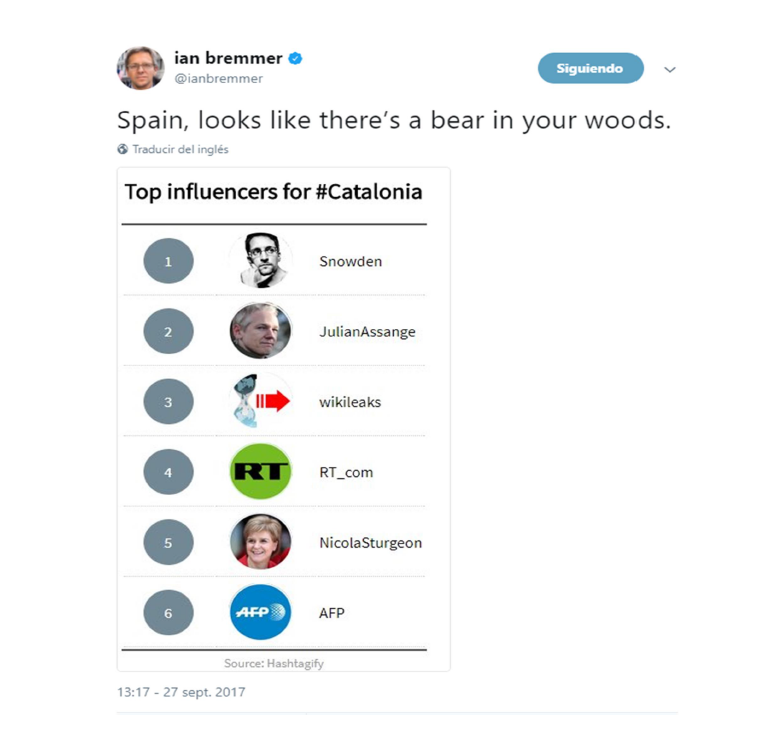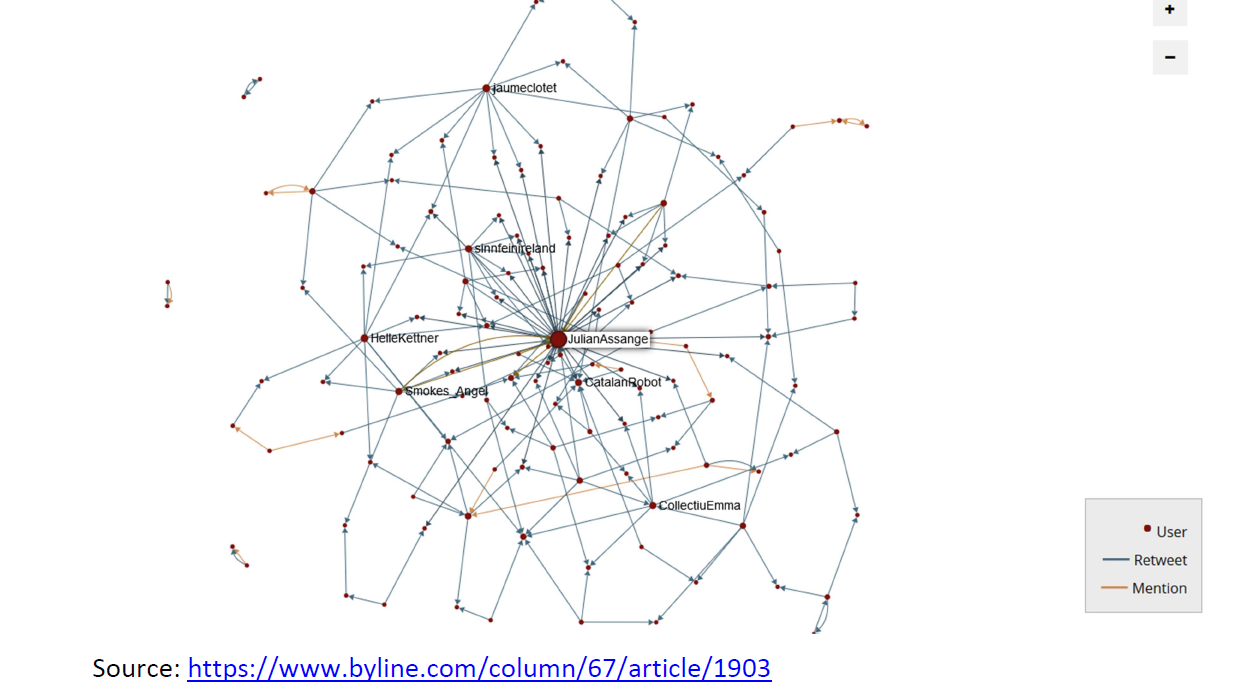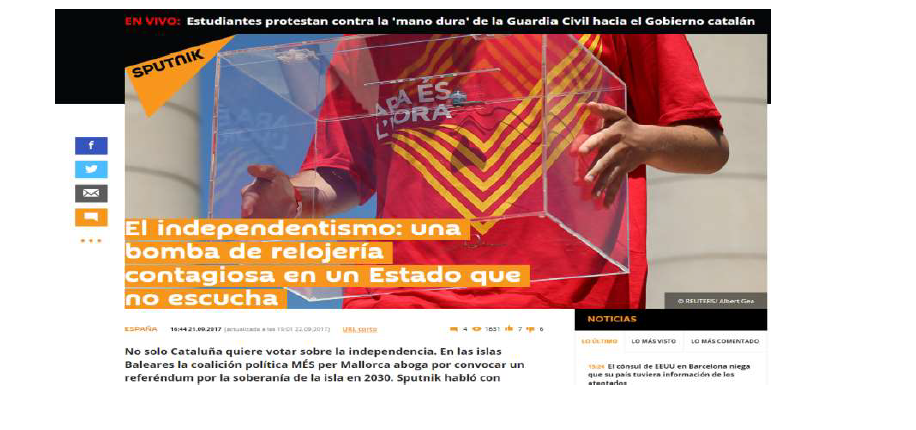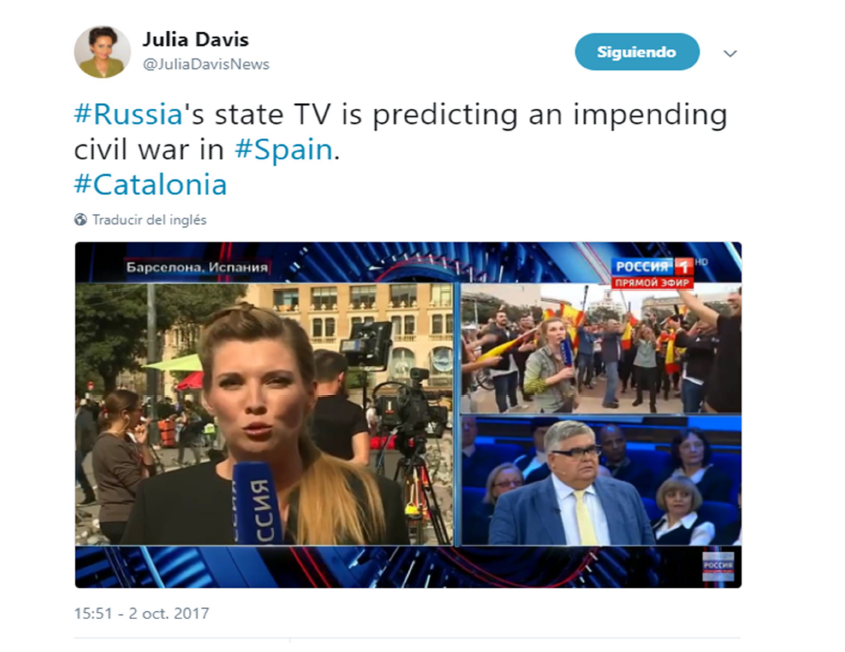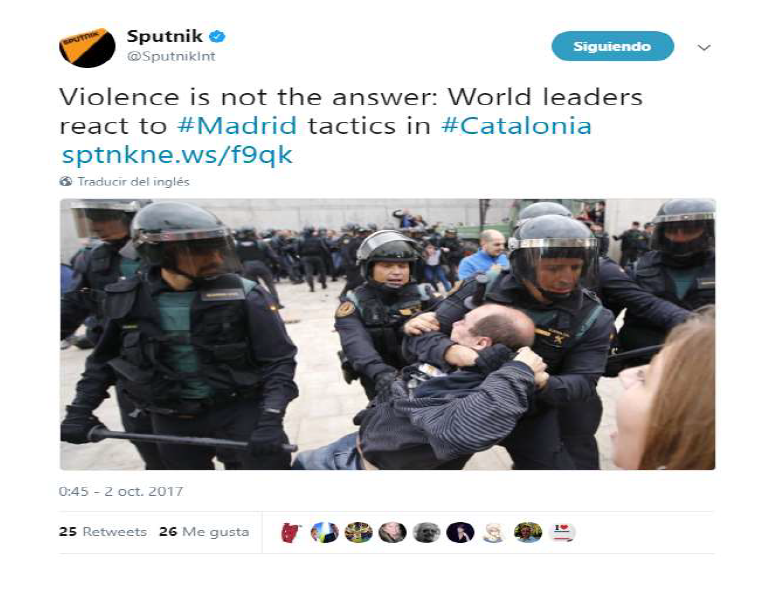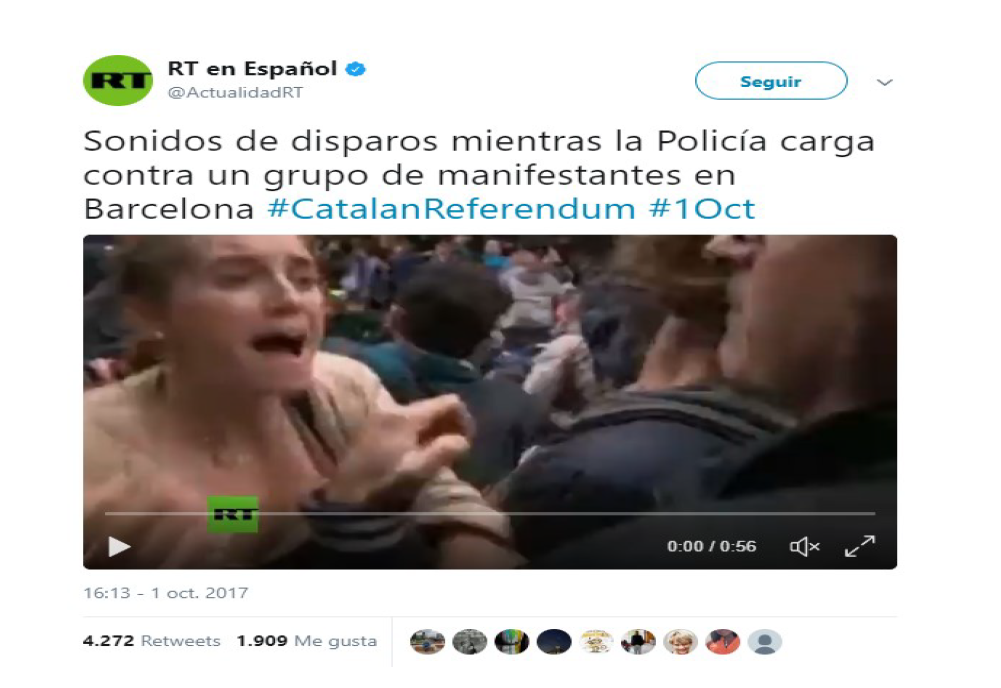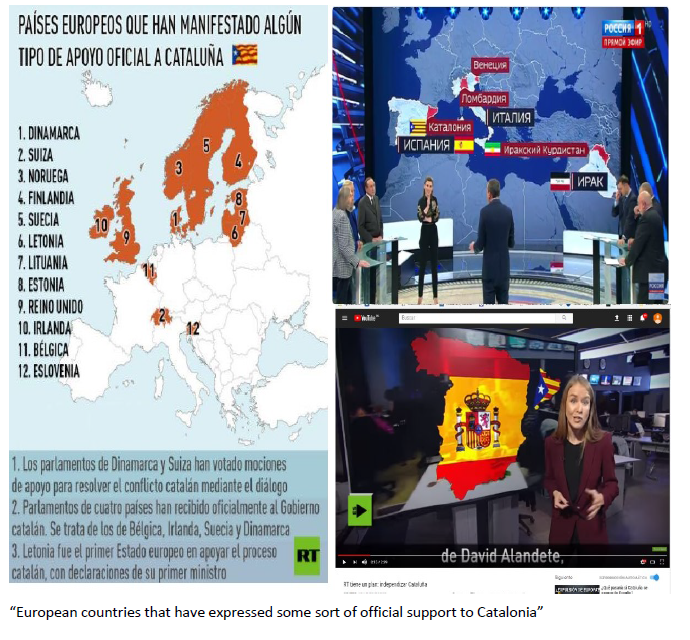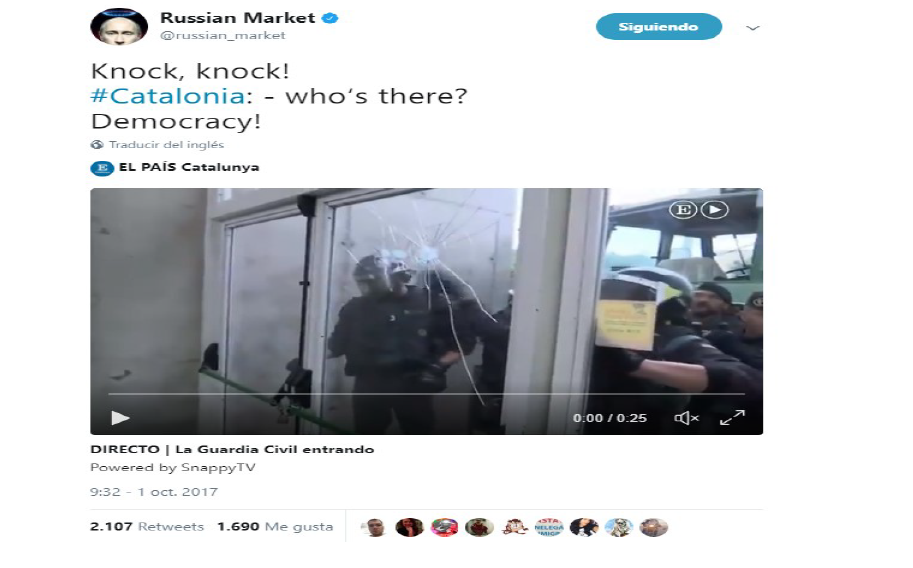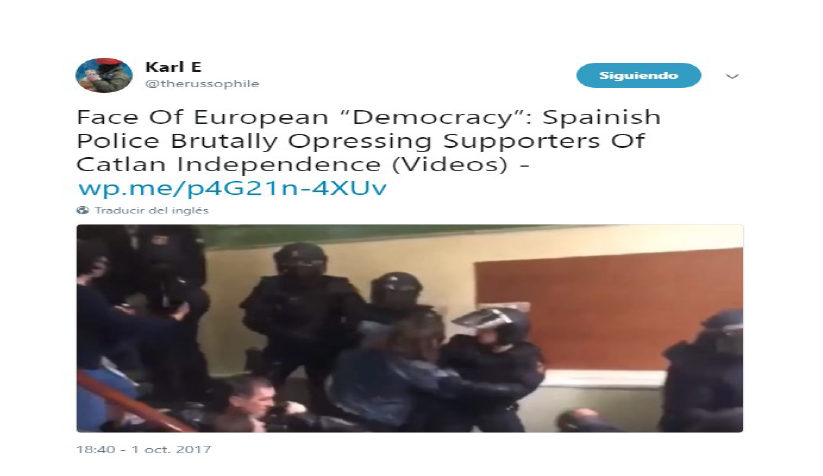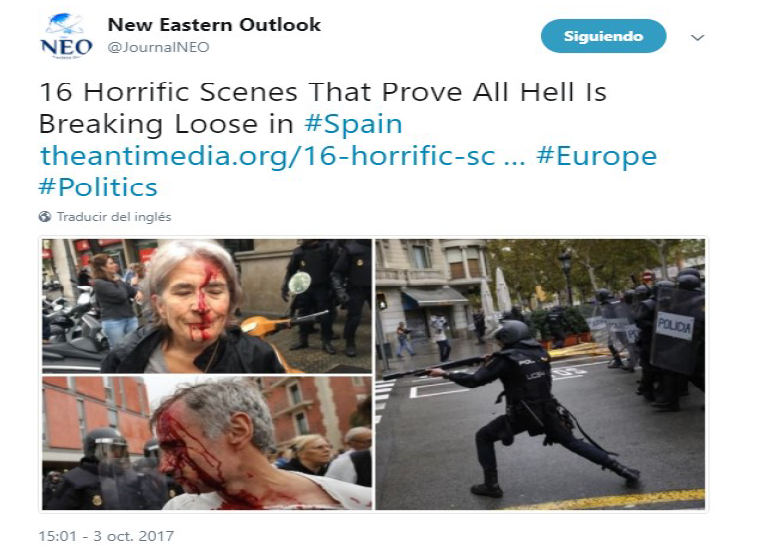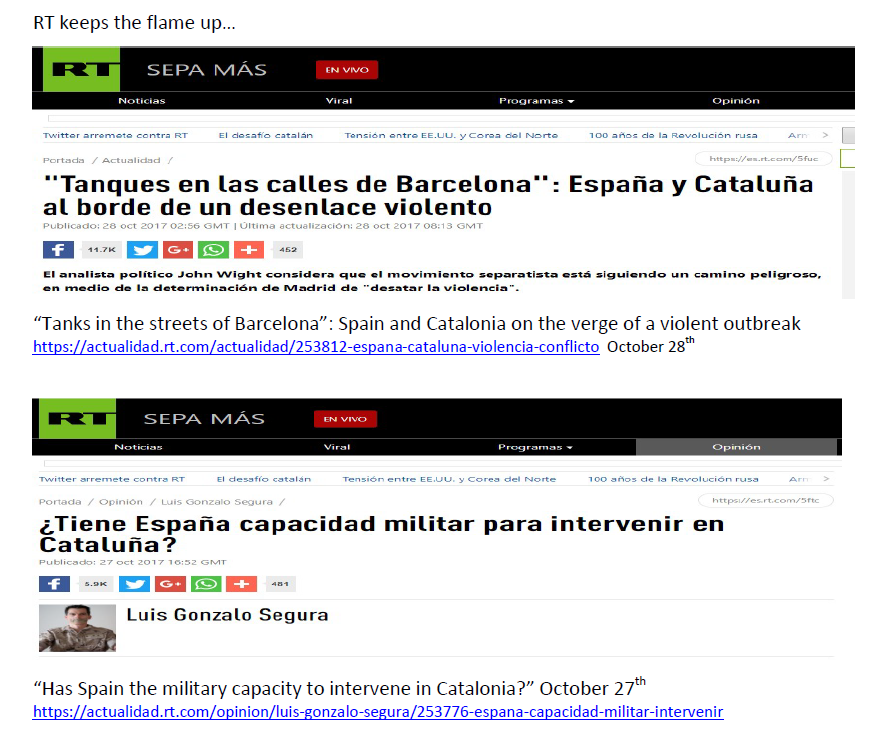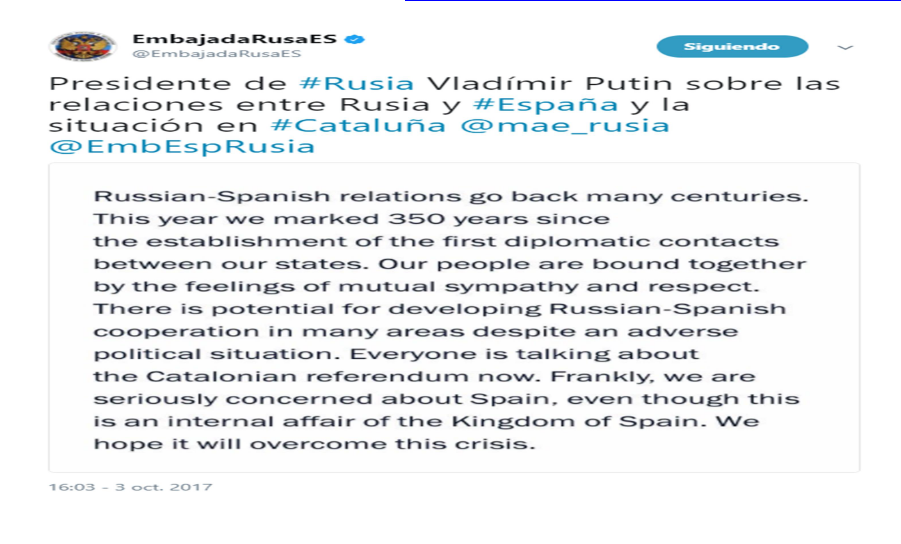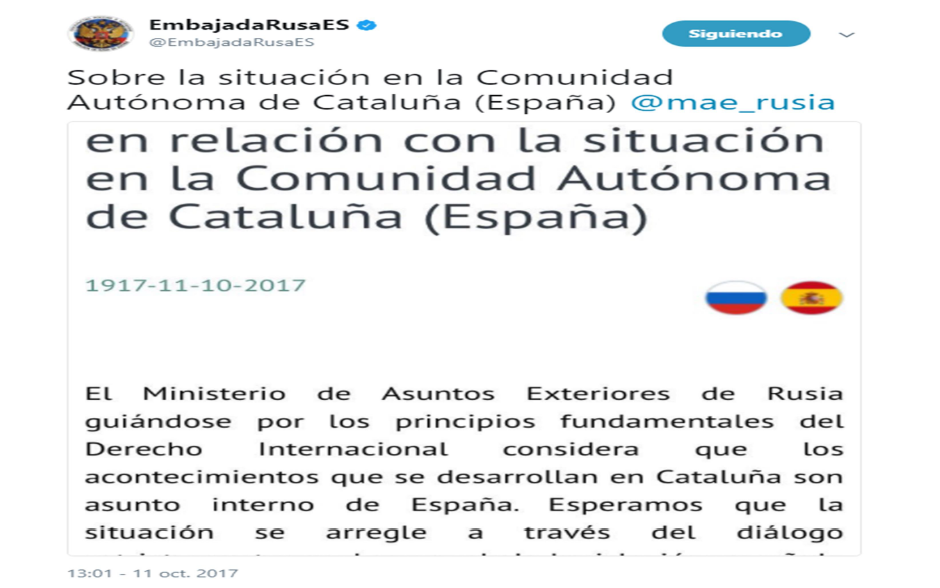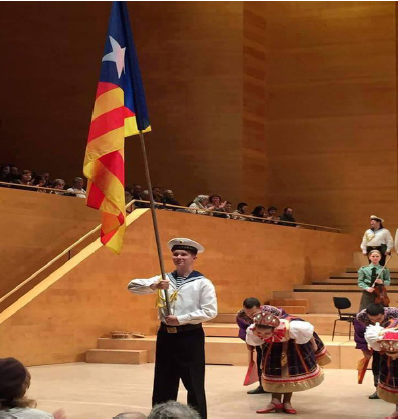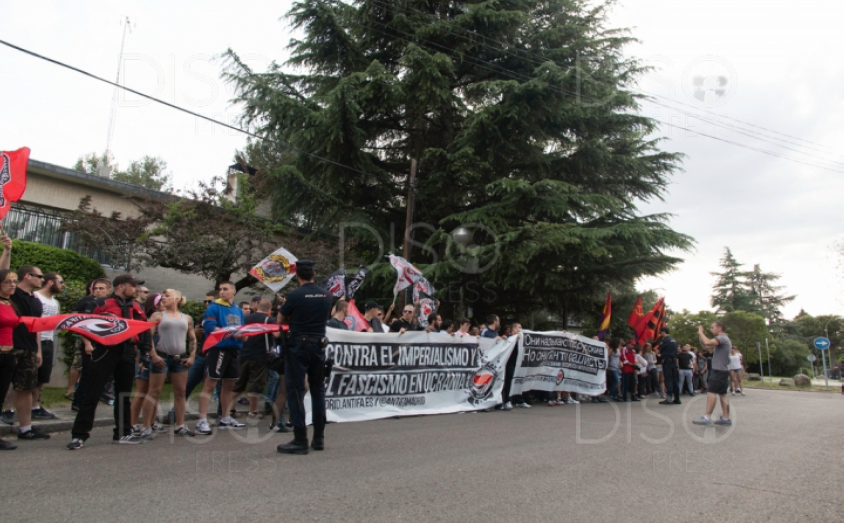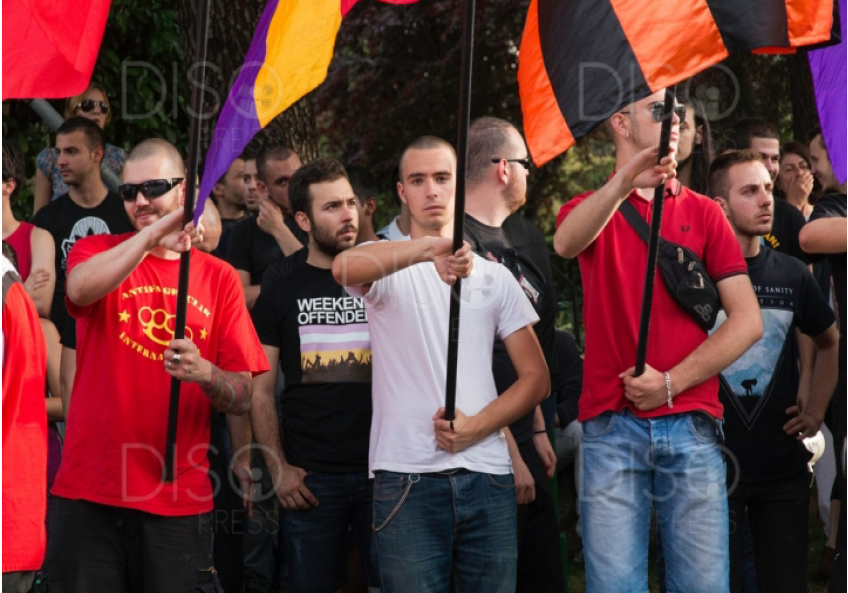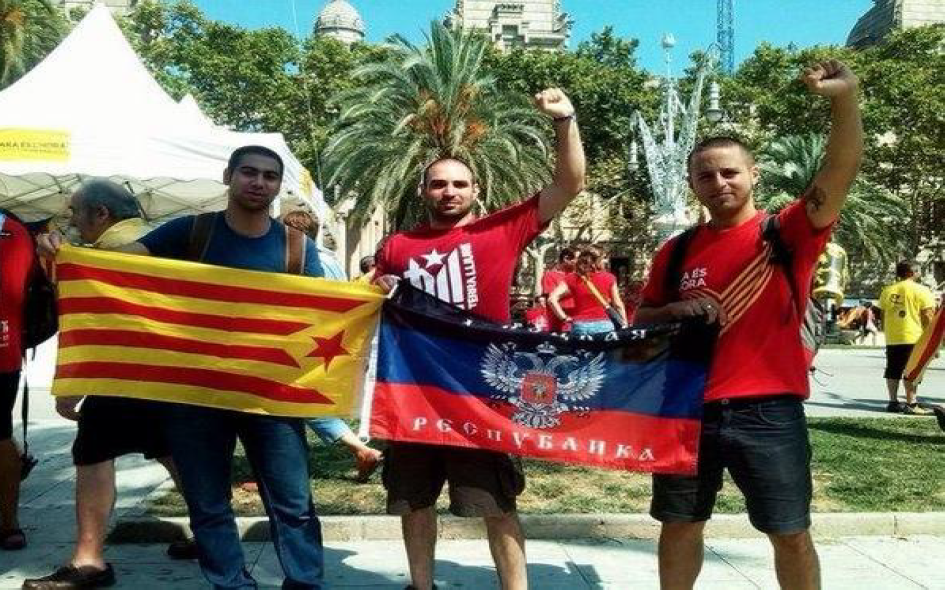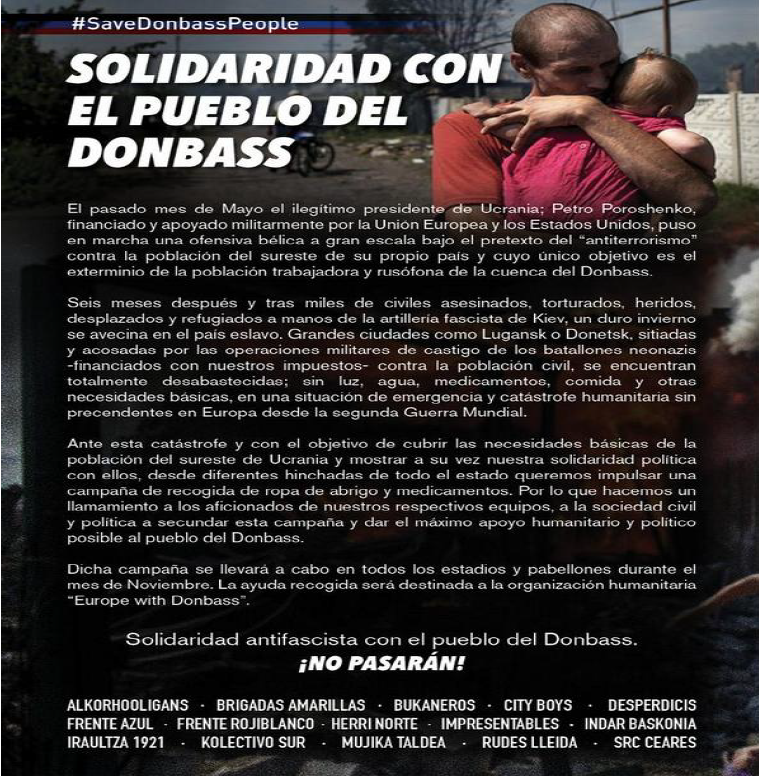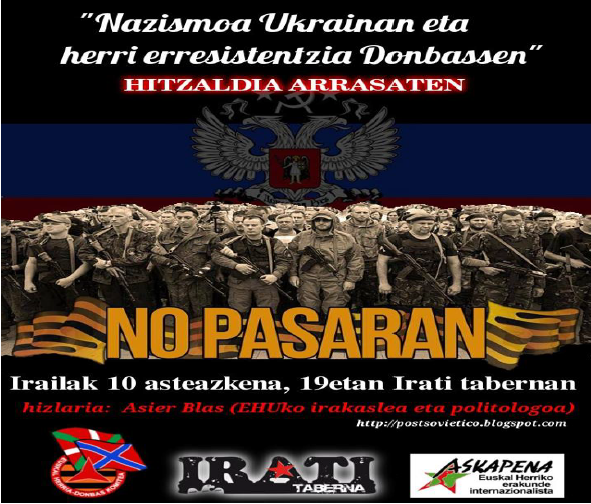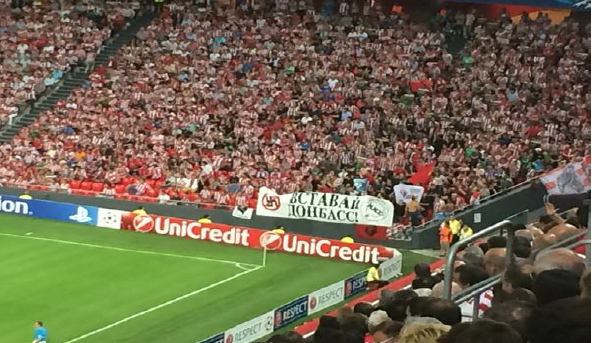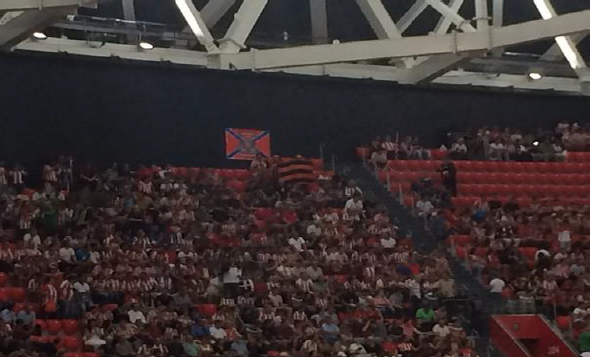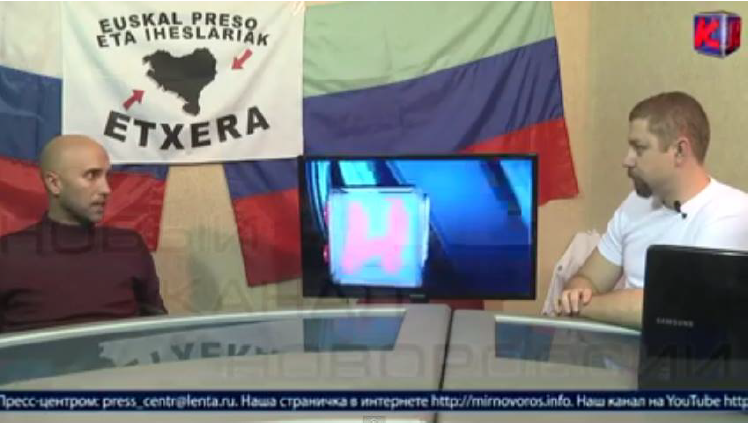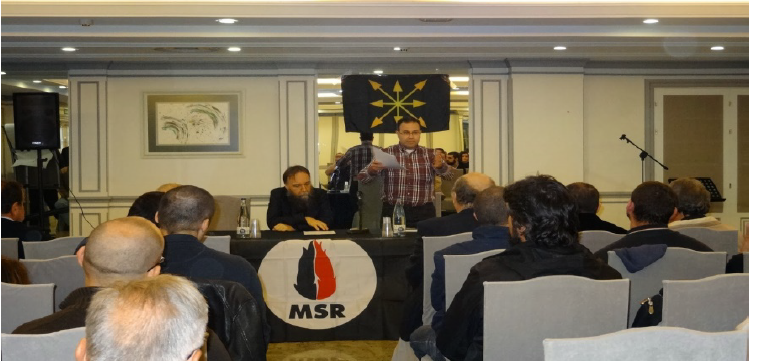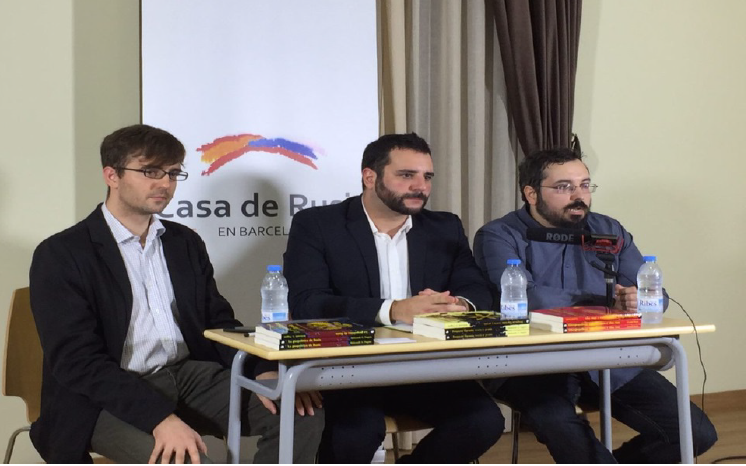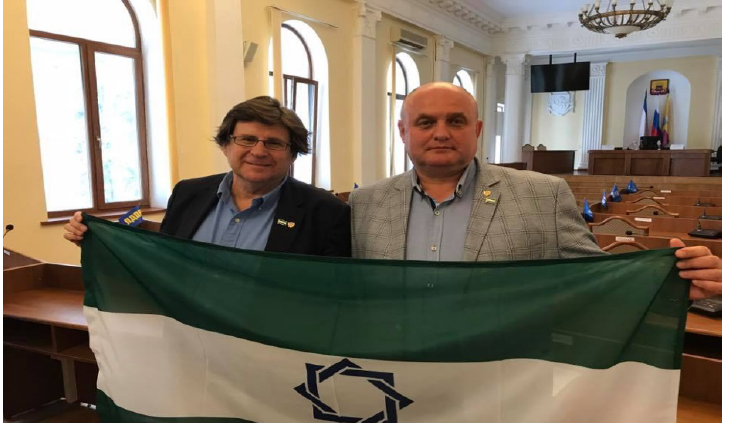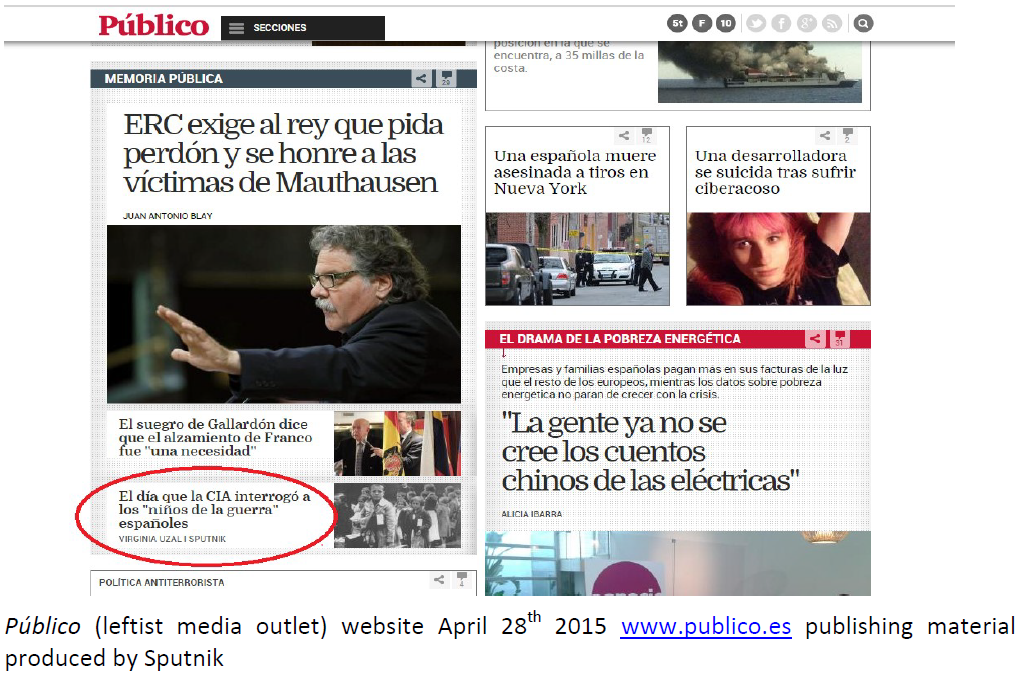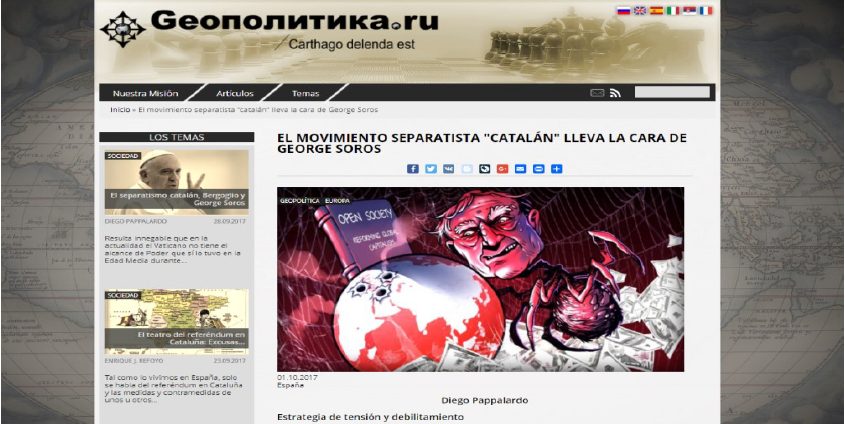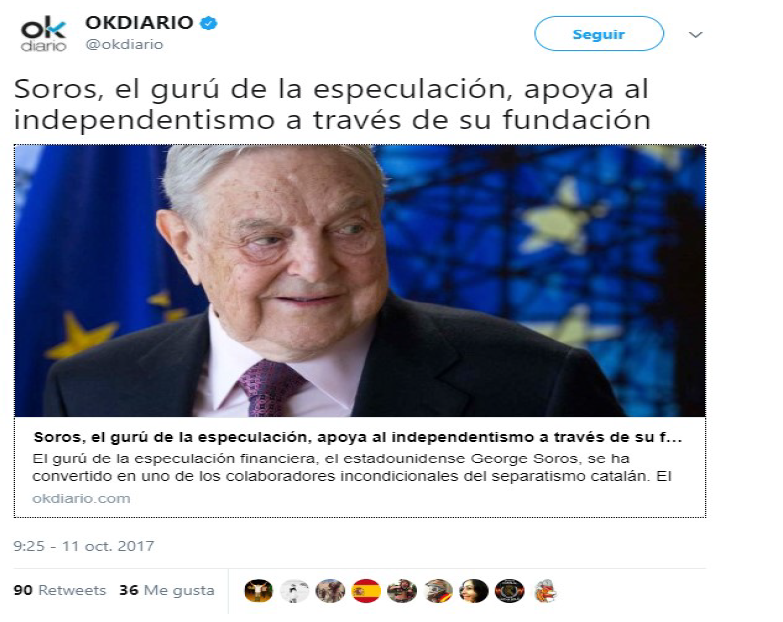Difference between revisions of "Document:Framing Russian meddling in the Catalan question"
(Description and subjects) |
(More tidy) |
||
| Line 97: | Line 97: | ||
Further investigations seem to confirm this point: | Further investigations seem to confirm this point: | ||
| + | |||
[[File:Integrity Framing Russian meddling in CAT1 (93).png]] | [[File:Integrity Framing Russian meddling in CAT1 (93).png]] | ||
[[File:Integrity Framing Russian meddling in CAT1 (94).png]] | [[File:Integrity Framing Russian meddling in CAT1 (94).png]] | ||
| Line 153: | Line 154: | ||
RT keeps the flame up… | RT keeps the flame up… | ||
| + | |||
[[File:Integrity Framing Russian meddling in CAT1 (995).png]] | [[File:Integrity Framing Russian meddling in CAT1 (995).png]] | ||
| Line 184: | Line 186: | ||
and established state. Who could have expected, even just recently, that the discussion | and established state. Who could have expected, even just recently, that the discussion | ||
of the status of '''Catalonia, which has a long history''', would result in an acute political crisis? | of the status of '''Catalonia, which has a long history''', would result in an acute political crisis? | ||
| − | Russia's position here is known. Everything that is happening is '''an internal matter''' for Spain | + | |
| + | :Russia's position here is known. Everything that is happening is '''an internal matter''' for Spain | ||
and must be settled based on Spanish law in accordance with democratic traditions. We are | and must be settled based on Spanish law in accordance with democratic traditions. We are | ||
aware that the country’s leadership is taking steps towards this end. | aware that the country’s leadership is taking steps towards this end. | ||
In the case of Catalonia, we saw the European Union and a number of other states unanimously | In the case of Catalonia, we saw the European Union and a number of other states unanimously | ||
condemn the supporters of independence. | condemn the supporters of independence. | ||
| − | You know, in this regard, I cannot help but note that more thought should have gone into this | + | |
| + | :You know, in this regard, I cannot help but note that more thought should have gone into this | ||
earlier. What, no one was aware of these centuries-old disagreements in Europe? They were, | earlier. What, no one was aware of these centuries-old disagreements in Europe? They were, | ||
were they not? Of course, they were. However, at one point they actually welcomed | were they not? Of course, they were. However, at one point they actually welcomed | ||
the disintegration of a number of states in Europe without hiding their joy. | the disintegration of a number of states in Europe without hiding their joy. | ||
| − | Why were they so unthinking, driven by fleeting political considerations and their desire | + | |
| + | :Why were they so unthinking, driven by fleeting political considerations and their desire | ||
to please – I will put it bluntly – their big brother in Washington, in providing their unconditional | to please – I will put it bluntly – their big brother in Washington, in providing their unconditional | ||
support to the secession of '''Kosovo''', thus provoking similar processes in other regions of Europe | support to the secession of '''Kosovo''', thus provoking similar processes in other regions of Europe | ||
and the world? | and the world? | ||
| − | You may remember that when '''Crimea also declared its independence''', and then – following | + | :You may remember that when '''Crimea also declared its independence''', and then – following |
the '''referendum''' – its decision to become part of Russia, this was not welcomed for some reason. | the '''referendum''' – its decision to become part of Russia, this was not welcomed for some reason. | ||
Now we have '''Catalonia'''. There is a similar issue in another region, Kurdistan. Perhaps this list is | Now we have '''Catalonia'''. There is a similar issue in another region, Kurdistan. Perhaps this list is | ||
| Line 250: | Line 255: | ||
meetings of Catalan and Andalusian secessionists with Russian politicians or members of the | meetings of Catalan and Andalusian secessionists with Russian politicians or members of the | ||
Antiglobalization Movement of Russia<ref>See http://anti-global.ru/?lang=en | Antiglobalization Movement of Russia<ref>See http://anti-global.ru/?lang=en | ||
| − | </ref> iv) growing attention paid to Spanish domestic affairs | + | </ref> iv) growing attention paid to Spanish domestic affairs by RT and Sputnik in Spanish. |
| − | by RT and Sputnik in Spanish. | ||
[[File:Integrity Framing Russian meddling in CAT1 (998).png]] | [[File:Integrity Framing Russian meddling in CAT1 (998).png]] | ||
| Line 260: | Line 264: | ||
[[File:Integrity Framing Russian meddling in CAT1 (999).png]] | [[File:Integrity Framing Russian meddling in CAT1 (999).png]] | ||
| + | |||
[[File:Integrity Framing Russian meddling in CAT1 (9991).png]] | [[File:Integrity Framing Russian meddling in CAT1 (9991).png]] | ||
Revision as of 05:16, 14 January 2020
| An example of Projection by the Integrity Initiative. The Monocloa operation shows that the group itself has been involved in subverting the Spanish political process. This document accuses Russia of involvment in the Catalonia independence question. |
Subjects: Spain, Catalonia, Catalonia/Independence, Julian Assange
Example of: Integrity Initiative/Leak/2, Integrity Initiative/Projection
Source: 'Anonymous'
★ Start a Discussion about this document
The German Cluster − Interim Report
Contents
What do we know so far?
The Kremlin backs Madrid and considers the Catalan crisis an internal affair of Spain - at least at the official level and for the time being. Despite this public endorsement, Moscow hasn’t missed the opportunity to use an issue that -depending on how it is presented- can fit well within its overall narrative of a declining, undemocratic and troubled EU that receives “a taste of its own medicine” (i.e. “a colour revolution” or a “Kosovo-type of unilateral independence”). Thus, Russian mainstream media and pro-Russian voices on Twitter are paying a remarkable amount of attention to the Catalan question. Well-known figures such as Julian Assange or Edward Snowden have made a sudden and notorious appearance in the Catalan debates raising suspicions of potential meddling by the Kremlin. The most prominent Spanish newspaper, El País, has denounced the interference in the crisis by the “Russian propaganda machine”. These articles[1] have triggered a public debate, mostly in Spain but not only, about the level of the Kremlin’s involvement. While the answer to this question is not obvious, the role played by Russian media outlets and bots seems hardly deniable at this point. The following sections offer some insights, background information and suggestions to contextualize and interpret the (likely) Russian meddling in Spain.
Two hypotheses to explain why Russia would interfere in Spain
Hypothesis 1: Russia has activated its propaganda apparatus to contribute to destabilizing Spain as this fits its overall narrative about a dysfunctional, weakening and almost collapsing EU
This has been the prevailing interpretation by external observers. It is the most likely one, but some nuances related to the specificities of Spain-Russia relationship are required in order to figure out what Russia wants to achieve from it.
Hypothesis 2: Catalan pro-independence activists bought Assange’s support.
Taking into account unsuccessful attempts by Catalan separatists to attract international attention before the events of October 1st, this option cannot be completely ruled out. It seems clear that Assange has been receiving support from Catalan nationalist activists and not only because some of his tweets were in Catalan. On several occasions, he reacted quickly and was well aware of nuances that only locals or those really familiar with the matter would know. This is something which, as far as is known, is not the case of Assange. These two hypotheses are not mutually exclusive and actually a merging of both is also possible. Only the order of who started and designed the first steps would change.
As mentioned above, the Catalan issue can fit well within the overall Russian narrative depicting an undemocratic and chaotic EU receiving “a taste of its own medicine”. This helps to justify authoritarian measures at home and to discredit the West and its values as a mere exercise in hypocrisy. Below the first and so far, the most controversial tweet published by Assange (setting the sensationalist tone of his tweets and frame of the Catalan issue):
One day and a half later, the Catalan Vice-President (regional Government) thanked him.
Other examples:
WikiLeaks has been publishing both in English and in Catalan and giving practical support to some Generalitat (Catalan regional government) initiatives
Assange has been actively involved and at times playing a highly-visible role
Assange’s tweets proved to be well connected to local on-going events and nuances
According to El País, Russian bots increased by 2,000% the impact of the Catalan question on
Twitter.
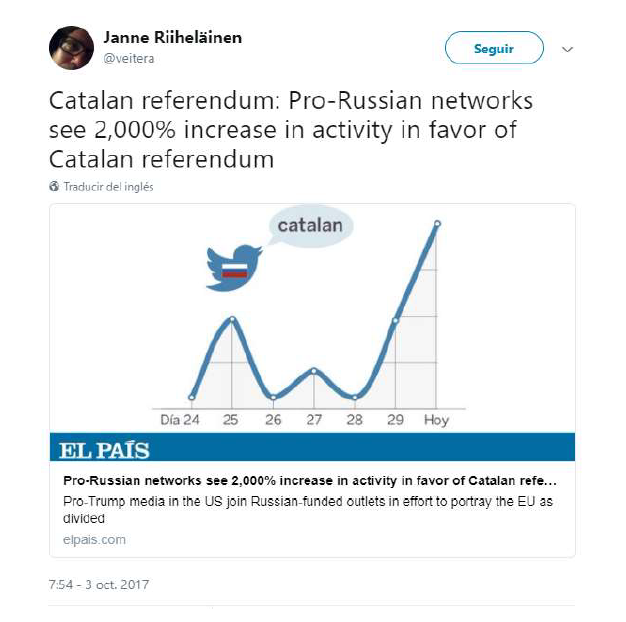
Further investigations seem to confirm this point:
According to research conducted by J.J. Patrick, a former police officer who is now a freelance journalist, Assange’s activity is part of a “focused disinformation campaign [devoted] to international audiences”.
Source: https://www.byline.com/column/67/article/1903
In this article, it is worth watching the two videos comparing patterns of how news-spread across social networks when there is or not a “concentrated deployment of a Kremlin-tasked asset”
Mainstream Russian media also stepped enthusiastically into the issue.
Sputnik’s headline reads as follows: “Pro-independence: a contagious time-bomb within a deaf State”
Civil war, violence, gunshots, misleading maps, hell…
“European countries that have expressed some sort of official support to Catalonia”
The usual suspects jumped in as well:
The DFRLAB research published on September 28 concluded that Sputnik has been more blatantly biased while the coverage of RT has been more balanced and professional.[2] The DFRLAB considers that some attributions and Kremlin links taken for granted by El País articles are questionable.
Regarding the RT coverage: the quality of its coverage throughout September can be attributed to the work of the main correspondent in Madrid (a Spanish journalist previously based in Moscow) who was deployed in Catalonia. In October, as the crisis deepened, RT changed the team in the field. What is remarkable is that despite the fact that Spanish nationals form a significant portion of the RT team (including those based in Madrid), RT decided to deploy two young Latin American journalists. This decision can be justified by presenting a more “neutral” approach (in order to prevent a Spanish view non-sympathetic with Catalan nationalists’ one from setting the tone of the coverage). The coverage since then was anything but neutral, giving voice almost exclusively to the “hundreds of injured and repressed civilians” and contributing to over-dramatise the violent nature of the events (beyond the unwise use of police force in some limited instances during the events of October 1st).[3]
RT keeps the flame up…
“Tanks in the streets of Barcelona”: Spain and Catalonia on the verge of a violent outbreak https://actualidad.rt.com/actualidad/253812-espana-cataluna-violencia-conflicto October 28th
“Has Spain the military capacity to intervene in Catalonia?” October 27th https://actualidad.rt.com/opinion/luis-gonzalo-segura/253776-espana-capacidad-militar-intervenir
President Putin has also made a couple of remarkable public statements on Catalonia over the last weeks. Firstly, on October 4th during a ceremony with the new ambassadors recently appointed to Russia, among them the Spanish one. Putin declared that Russia considers this “an internal affair of the Kingdom of Spain”[4] and hoped that “Spain will overcome the crisis”. What it is remarkable is that Putin explicitly mentioned “the Catalan referendum” conferring implicitly some legitimacy to it. Besides, while he was officially backing Madrid, he was also contributing to the Russian narrative that overstates the dramatism of the situation. Of course, these two points might be considered too subtle to elaborate any explanation on their ground, but they confirm that the Kremlin is keeping a close eye on the crisis. Here the video of Putin’s statement https://www.youtube.com/watch?v=XXzVZ_XsMOk
Note the emphasis here on referring to Catalonia as an Autonomous Community
Putin made his second public comment on Catalonia during a meeting of the Valdai Club held on October 19th. His words were:
- The situation in Spain clearly shows how fragile stability can be even in a prosperous
and established state. Who could have expected, even just recently, that the discussion of the status of Catalonia, which has a long history, would result in an acute political crisis?
- Russia's position here is known. Everything that is happening is an internal matter for Spain
and must be settled based on Spanish law in accordance with democratic traditions. We are aware that the country’s leadership is taking steps towards this end. In the case of Catalonia, we saw the European Union and a number of other states unanimously condemn the supporters of independence.
- You know, in this regard, I cannot help but note that more thought should have gone into this
earlier. What, no one was aware of these centuries-old disagreements in Europe? They were, were they not? Of course, they were. However, at one point they actually welcomed the disintegration of a number of states in Europe without hiding their joy.
- Why were they so unthinking, driven by fleeting political considerations and their desire
to please – I will put it bluntly – their big brother in Washington, in providing their unconditional support to the secession of Kosovo, thus provoking similar processes in other regions of Europe and the world?
- You may remember that when Crimea also declared its independence, and then – following
the referendum – its decision to become part of Russia, this was not welcomed for some reason. Now we have Catalonia. There is a similar issue in another region, Kurdistan. Perhaps this list is far from exhaustive. But we have to ask ourselves, what are we going to do? What should we think about it?
The full speech can be found here http://en.kremlin.ru/events/president/news/55882
The message is crystal clear and consistent with Putin’s narratives and views: the West is to blame, has double standards and everything started with Kosovo.
Last, but not least, South Ossetia has just opened a “diplomatic representation” in Barcelona. Dmitri Medoyev, minister of foreign affairs of South Ossetia and close to Putin according to some sources, visited Barcelona in the last week of October to open the office.
See https://mundo.sputniknews.com/politica/201710251073463995-politica-relaciones-barcelona-tjinval/ https://elpais.com/elpais/2017/10/26/inenglish/1509011964_600939.html
Why Spain? The Spain-Russia relationship
Therefore, the key questions are why/what for, i.e. what is Russia trying to achieve and whether or not the Kremlin is interested in the splitting of Spain.
Why? The Spain-Russia relationship is fluent and friendly, but so far with relatively limited political, social and economic links. Madrid’s position has sometimes been characterized as a balancing act between a pro-EU-NATO vector and a Russian-friendly one which sees Moscow mainly through an economic lens and as an almost-indispensable partner in dealing with some key international issues. From an economic point of view, while the current total figures are modest, Russia is considered by Spanish authorities as a key partner in tourism and real estate, two crucial sectors for the Spanish economic recovery. In addition, Russia is seen as a potentially promising source of opportunities for Spanish civil engineering and infrastructure companies.
Despite its understanding approach and traditionally low-profile on NATO’s Eastern flank (excluding the NATO Policing mission in the Baltics), Spain has now deployed 300 troops in Latvia as part of NATO’s Enhanced Forward Presence multinational battlegroups in the Baltic countries and Poland. Spain is deploying a mechanized infantry company in armored fighting vehicles including Leopard tanks which are being deployed abroad for the first time ever in history, together with cyber security experts in Estonia. In July 2017, PM Mariano Rajoy made a strong endorsement of the mission during his visit to the Spanish troops in Adazi (Latvia) on the grounds of defending freedom, and even supported the possibility of Spain leading the multinational battlegroup.
These developments have probably not passed unnoticed in Moscow. Is this meddling in the Catalan issue some sort of reminder or message to Madrid from the Kremlin?
Since the outbreak of the crisis in Ukraine, there has been some significant pro-Russian activity under the surface in Spain. In certain specific cases, there are indications of some sort of undisclosed Russian official support. This activity has consisted mostly in i) antifa movements supporting “Donbas antifascist fight” throughout Spain ii) links with far-right groups like the MSR or PxC (including translation into Spanish of all the books by Alexander Dugin) iii) meetings of Catalan and Andalusian secessionists with Russian politicians or members of the Antiglobalization Movement of Russia[5] iv) growing attention paid to Spanish domestic affairs by RT and Sputnik in Spanish.
Russian chorus show in Barcelona January 2nd, 2016
This event triggered controversy and later on, the organizers, apologised. See
https://www.elconfidencialdigital.com/politica/ejercito-disculpas-estelada-concierto-Barcelona_0_2631936809.html
Demonstration in front of the Ukrainian embassy in Madrid, May 10th 2015
https://www.youtube.com/watch?v=uOcaXuQDS_o
Spanish antifa activists took part in the two “Anti-Fascists caravans to Donbass” organized by the Banda Bassotti (an Italian ska band). High-quality videos of both trips were edited and uploaded on youtube. See for instance https://www.youtube.com/watch?v=GP-0GEAdzQE, https://www.youtube.com/watch?v=1RAmQRk7d0o, https://www.youtube.com/watch?v=A5HpLhuN8Ys. During the second tour in May 2015 the caravan was accompanied by a reporter from Tele Sur (Venezuelan public TV which has a partnership with RT) -see https://www.youtube.com/watch?v=ZvIRSTOuJYg.The same group or another connected to them organized some anti-Ukrainian rallies in Spain throughout 2014. Though irrelevant in terms of participants or political influence, these were extensively covered by RT (see for instance https://www.youtube.com/watch?v=wtorXNZpeE4 and Spanish volunteers on Russian First Channel https://www.youtube.com/watch?v=JGdPgYGj2VY).
“Donbas antifascist fight” is already part of the antifa imagery in Spain
Athletic Bilbao-Shakhtar Donetsk, Bilbao September 2014
Novorossiya TV showing a poster of support to ETA inmates
Aleksandr Dugin, Madrid November 11th, 2013
Barcelona October 2016, presentation of one of Dugin’s books translated into Spanish at Casa Rusia, an institution devoted to public diplomacy that functions under the umbrella of the Russkyi Mir foundation. Some of these individuals (belonging to far right groups) are occasional contributors to RT and regular ones to the Katehon website which has a remarkable Spanish version.
Andalusian delegation to Crimea in April 2017 that established “official links” and gave “support to Crimea’s annexation by Russia”. The “delegation” was led by a nobody who chairs a fringe organization called “The Andalusian National Assembly” which aims to achieve the independence of Andalusia.
List of delegation members
http://ldpr-rk.ru/%D0%B2-%D0%B1%D0%BE%D0%BB%D1%82%D1%83%D0%BD%D0%BE%D0%B2- %D0%B0%D0%BA%D1%82%D1%8B-%D0%BD%D0%B0%D1%80%D0%BE%D0%B4%D0%BD%D0%BE%D0%B9- %D0%B4%D0%B8%D0%BF%D0%BB%D0%BE%D0%BC%D0%B0%D1%82%D0%B8%D0%B8/
Conference hold in Simferopol: http://crimea.ria.ru/press/20170411/1109869270.html On the Russian media: http://1tvcrimea.ru/pages/news/063180-iz-andaluzii-v-krym-na-poluostrov-pribyla-gruppapolitikov- i-obschestvennikov-i
Since he visited Crimea, the head of the delegation (a perfect example of a useful idiot) has been raising the issue of lifting the sanctions; so far only in small news outlets: https://www.youtube.com/watch?v=wmYDEGV7Mz4 http://www.lahorademalaga.com/la-ana-y-el-pna-somos-andaluces-viajan-a-rusia-y-crimea/ http://www.lahorademalaga.com/la-asamblea-nacional-andaluza-contara-con-una-delegacion-permanente-en-crimea/
Público (leftist media outlet) website April 28th 2015 www.publico.es publishing material produced by Sputnik
To sum up: this activity and these developments have had a limited political impact. So far, this activity has been restricted to very specific niches, mostly on both extremes. However, step by step, Russia seems to be establishing an extensive network of pawns here and there. Furthermore, Russia is setting up a communicative structure (RT, Sputnik, nurturing fake experts plus influencing through personal discreet meetings) that in the mid-term will probably be able to spread and fix views, narratives and topics in local agendas in Spain. Therefore, to overstate the current political impact of this activity would be as wrong as to neglect it entirely.
Is Russia interested in the secession of Catalonia?
In short, the answer is probably no. Though there are four good arguments to sustain the opposite: i) Russia considers a divided Europe a desirable goal ii) Catalan secession might have an impact on similar movements within key EU countries such as Italy, Germany, etc. iii) a newly-born Catalan state would probably be an easy target for Russian intel and diplomacy (Russia’s capacity as a permanent member of the UNSC has been highlighted many times in Catalan debates) and iv) a weakened Spain will definitely be more receptive to the Kremlin’s messages (and more given the fact that Spain’s main security concerns lie in the Southern flank).
However, the risks and potential gains supporting Madrid weigh probably more in the Kremlin’s calculation: a) similar separatist movements in some regions of Russia might also be encouraged b) it is well known and documented that Russian oligarchs and those associated with the mafia have properties and investments in the tourist and real estate sector on the Catalan coast (the financial storm that the issue is already causing might have an impact on them as well) and c) supporting Madrid over this may grant Moscow leverage over Madrid (the fourth economy in the Eurozone and still one of the most stable EU member states).
Then What for? Real leverage over Madrid is precisely what the Kremlin seems to be looking for. From this point of view, beyond the Government and officials, Moscow sees the conservative sectors as the most suitable target for its policies and operations (and they probably consider leftists as useful idiots but not the most interesting targets). Far right supporters and conservatives disappointed with the ruling (and moderate) Popular Party show a growing sympathy for Putin’s Russia. While this sector is not yet politically relevant, the rise of Spanish nationalism as a reaction to the Catalan issue will probably trigger the growth of parties like VOX (direct links with Moscow seem tenuous so far). That would explain why pro- Russian conservative websites are now blaming Soros for the Catalan crisis. This story has been taken up by the most conservative Spanish newspapers.
Thinking ahead
Catalonia is already part of Russia’s big narrative about the West; but in the same manner, Russian meddling is also part of the debates in Spain. This represents a clear window of opportunity as it has raised awareness of the threat posed by Russian disinformation campaigns. However, Spain still is, as almost if not all EU countries, vulnerable through money (business sector). The Russian Embassy in Madrid seems to be supporting the establishment of one supposedly independent Spanish think tank aiming to gather representatives of the local civil society, including business sectors. Furthermore, RT in Spanish while mostly oriented to Latin American audiences is also expanding is outreach in Spain. The stakes, then, are high and the outcome of the battle is far from certain…
References
- ↑ See “How Russian news networks are using Catalonia to destabilize Europe”, September 25th 2017 https://elpais.com/elpais/2017/09/25/inenglish/1506323273_063367.html “Russian meddling machine sets sights on Catalonia”, September 28th 2017 https://elpais.com/elpais/2017/09/26/inenglish/1506413477_994601.html “Russian “hackers” help keep banned Catalan referendum census site online” September 28th 2017 https://elpais.com/elpais/2017/09/28/inenglish/1506588970_026442.html
- ↑ See https://medium.com/dfrlab/electionwatch-russia-and-referendums-in-catalonia-192743efcd76
- ↑ Of course, it can hardly be said that RT was alone in this business. See for instance Peter Preston, “Violence in Catalonia needed closer scrutiny in age of fake news”, The Guardian, 8 October 2017 https://www.theguardian.com/world/2017/oct/08/catalonia-demo-injuries-fact-checking
- ↑ All emphasis added
- ↑ See http://anti-global.ru/?lang=en
